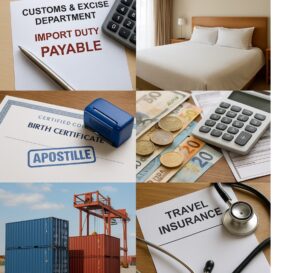
Planning an international move usually starts with the big numbers. The shipping quote, the plane tickets, maybe the deposit on a new apartment. Most people think they’ve got their budget sorted once these major expenses are covered, but then reality kicks in with a whole collection of costs that somehow never made it onto anyone’s moving checklist.
The thing about international moves is that every country has its own way of doing things, and many of these ways involve fees that don’t exist in domestic relocations. Some of these costs are genuinely unavoidable, while others catch people off guard simply because nobody thinks to mention them.
Customs and Import Duties: The Unwelcome Surprise
Customs fees represent one of the biggest budget shocks for international movers. Even personal belongings can trigger import duties depending on the destination country and the value of shipped items. Some countries have generous allowances for household goods when establishing residency, while others treat everything as potentially taxable imports.
The paperwork alone can generate costs. Customs brokers often charge handling fees, and some countries require professional inventory assessments before releasing shipments. These professional services add hundreds or even thousands to moving costs, but skipping them isn’t really an option when belongings are sitting in a port somewhere.
Many families discover that certain items trigger higher duty rates. Electronics, artwork, and luxury goods often face steeper import taxes than basic household items. Companies that specialize in international relocations, such as Seven Seas Worldwide, typically provide guidance on these regulations, but the actual fees still come as a shock when the bills arrive.
Temporary Accommodation Costs That Add Up Fast
Most international moves involve some period of temporary housing, and this expense can balloon quickly. Hotels, serviced apartments, or short-term rentals charge premium rates, especially in major cities where many international relocations begin or end.
The challenge extends beyond just nightly rates. Eating out for every meal gets expensive fast when cooking facilities aren’t available. Laundry services, parking fees, and even basic toiletries add up when staying in temporary accommodation for weeks rather than days.
Some families find themselves in temporary housing longer than expected when permanent accommodations fall through or paperwork delays occur. What was budgeted as a one-week hotel stay can stretch into a month-long expensive ordeal.
The Documentation Dance and Its Price Tag
International moves generate an impressive amount of paperwork, and much of it costs money to obtain. Birth certificates, marriage certificates, educational transcripts, and professional licenses often need official translations or apostille authentication. Each document might cost $50-100 to process properly, and most moves require multiple documents.
Medical records present their own challenges. Getting complete medical histories transferred internationally often involves administrative fees from doctors’ offices, copying costs, and sometimes specialized medical translation services. Pet relocations require veterinary certificates, vaccinations, and sometimes quarantine fees that can reach thousands of dollars.
Professional licenses and qualifications frequently need verification or conversion processes that involve application fees, exam costs, or mandatory training programs. Teachers, doctors, engineers, and other professionals often discover their credentials need expensive updates or certifications before being recognized in their new country.
Currency Exchange: The Hidden Tax on Everything
Currency exchange rates affect more than just the obvious expenses. Every international wire transfer, every foreign credit card transaction, and every currency conversion involves fees and unfavorable exchange rates that eat away at budgets in small but persistent bites.
Banks typically charge both flat fees and percentage-based charges for international transfers. Credit cards add foreign transaction fees on top of their exchange rate margins. Even supposedly “no fee” services often build costs into less favorable exchange rates.
The timing of currency exchanges can significantly impact moving costs. Exchange rates fluctuate, and major expenses like shipping fees or housing deposits might need to be paid when rates are unfavorable, adding hundreds or thousands to the effective cost.
Storage and Shipping Delays
International shipping rarely goes exactly according to schedule, and delays often trigger additional costs. Port strikes, weather delays, or customs holdups can result in extended storage fees that weren’t part of the original shipping quote.
Some moving companies charge demurrage fees when containers sit at ports longer than expected. These daily storage charges can accumulate quickly, especially during busy shipping seasons or when documentation issues slow customs clearance.
Air freight, while faster, comes with its own cost surprises. Weight restrictions are stricter than sea freight, and excess baggage fees can be shocking. Many families end up shipping items by air that they hadn’t originally planned to, driving up costs significantly.
Insurance Gaps and Coverage Limitations
Standard shipping insurance often covers less than people expect. Full replacement value coverage costs extra, and many policies exclude certain types of damage or loss. Electronics, artwork, and fragile items frequently need additional specialized coverage.
Health insurance gaps between leaving one country and establishing coverage in another can create expensive medical situations. COBRA extensions, travel insurance, or temporary health policies add costs that weren’t part of the original moving budget.
Car insurance, homeowner’s insurance, and other policies often need to be maintained in the original country while establishing new coverage in the destination country, creating a period of double insurance payments.
Moving abroad involves more hidden costs than most people anticipate, but awareness helps with planning. Building a buffer into moving budgets for these unexpected expenses can prevent financial stress during what’s already a challenging transition. The key is remembering that international moves involve two countries’ worth of regulations, fees, and requirements, each with its own way of extracting money from the process.
